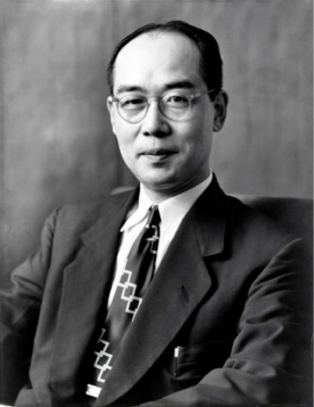
A physicist and the first Japanese Nobel Prize winner who explored the world of unknown with a creative mind
From 1933 to 1939, Hideki Yukawa was a lecturer and assistant professor at the School of Science, Osaka Imperial University. During this period, he proposed the meson theory, and then later received the Nobel Prize in physics for his achievement, the meson theory.
Chronological table
Born in Tokyo as the third son of Takuji Ogawa who later became professor of geology.
His father became a professor at Kyoto Imperial University and the family moved to Kyoto.
Enrolled in the Faculty of Science English Category at the Third High School.
Entered the Department of Physics, Faculty of Science, Kyoto Imperial University.
Graduated from the Department of Physics, Faculty of Science, Kyoto Imperial University.
Began research in theoretical physics as the assistant of the Faculty of Science, Kyoto Imperial University.
Became a lecturer in the Faculty of Science, Kyoto Imperial University.
Married Sumi Yukawa and took the Yukawa family name.
Began working as a part-time lecturer in the School of Science, Osaka Imperial University.
Engaged in the research in elementary particle physics in the unfettered research environment at Osaka Imperial University and worked on the development of the meson theory.
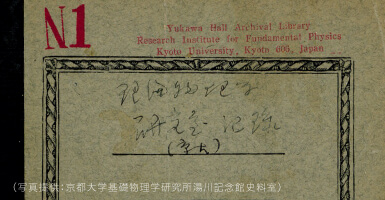
Became a full-time lecturer in the School of Science, Osaka Imperial University.
Yukawa announced his prediction of the existence of mesons in the conference of the Mathematical and Physical Society of Japan. He submitted a paper, “On the Interaction of Elementary Particles. I”. This research led to Yukawa’s reception of the Nobel Prize.
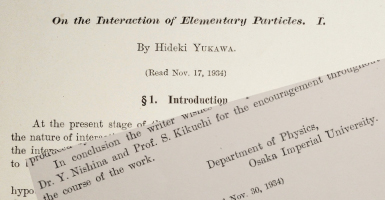
Became an assistant professor at Osaka Imperial University and worked in the School of Science.
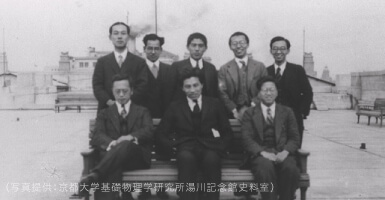
Hideki Yukawa in the back row at the left end and Seishi Kikuchi in the front row at the center.
Obtained Doctorate degree in physics (No. 584) from Osaka Imperial University.
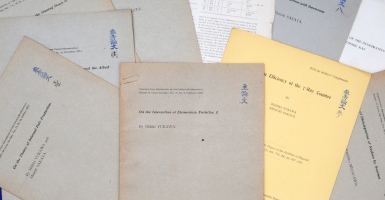
Invited to the Solvay Conference on Physics (September).
Became Professor of Kyoto Imperial University and worked in the Faculty of Science.
Awarded the Imperial Prize of the Japan Academy.
Received the Decoration of Cultural Merit from the Japanese government.
Published the first issue of the academic journal, Progress of Theoretical Physics.
Became a member of the Imperial Academy.
Invited to the Institute for Advanced Study in Princeton, NJ, U.S.A.
Became Visiting Professor of Columbia University and moved to New York.
Received the Nobel Prize in physics in recognition of his meson theory of nuclear forces.
The blackboard that Professor Hideki Yukawa regularly used in his lab in Columbia University was transported to The University of Osaka Graduate School of Science in 2014 and spurs active discussions among students and teaching staff.

Became Honorary Professor of The University of Osaka.
Became Director of the newly established Yukawa Institute for Theoretical Physics, Kyoto University.
Yukawa Memorial, The University of Osaka was inaugurated.
Attended the 1st Pugwash Conference held in Canada pursuant to the Russell-Einstein Manifesto.
Held the 1st Kyoto Conference of Scientists together with Shin-ichiro Tomonaga and Shoichi Sakata.
Retired from Kyoto University and became Honorary Professor of Kyoto University.
Hosted the 4th Kyoto Conference of Scientists.
Died at his home in Shimogamo, Kyoto.

